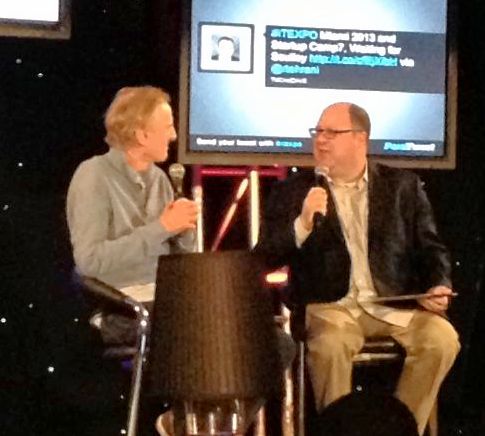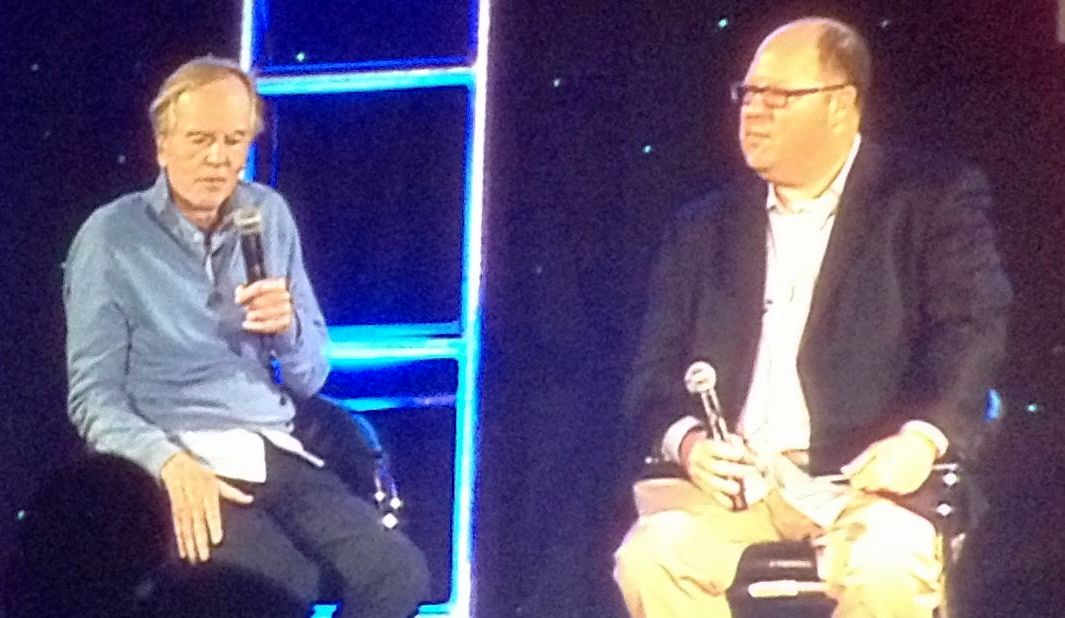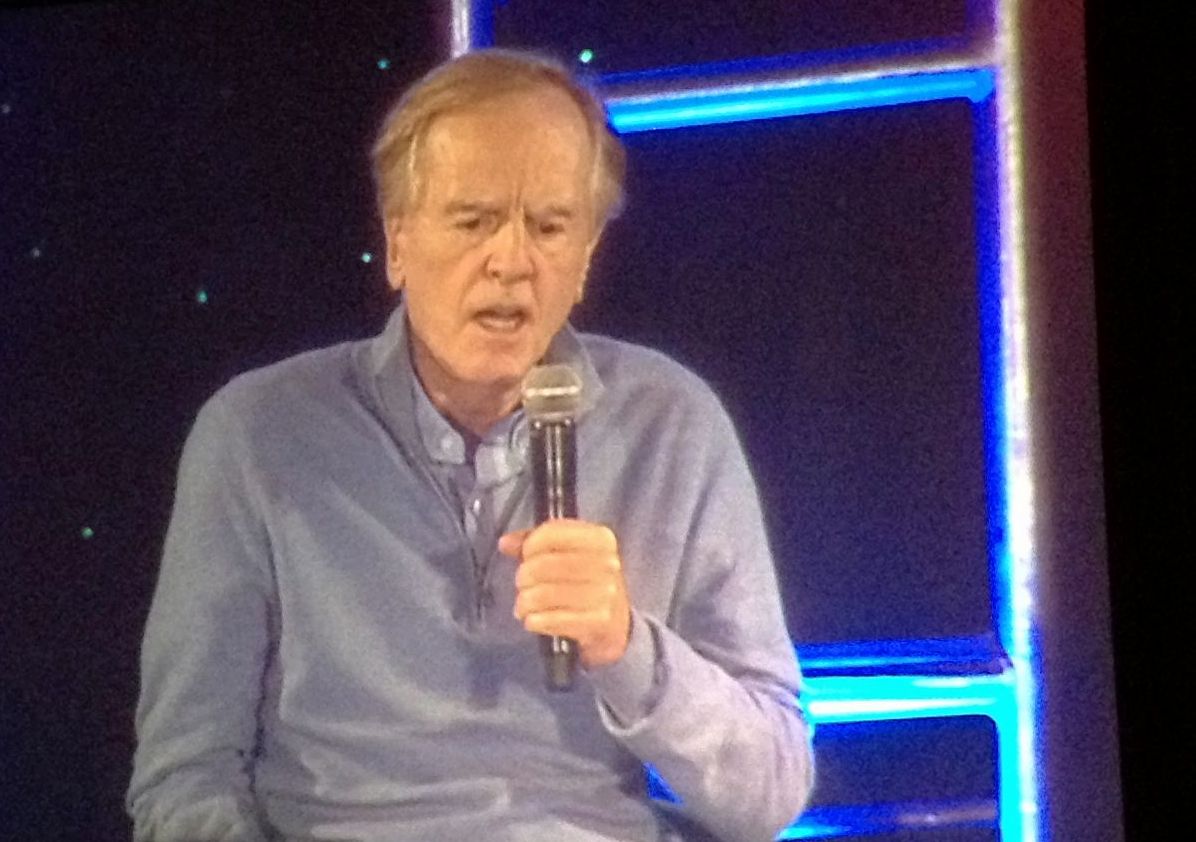John Sculley, formerly of Apple, formerly of PepsiCO, and now a startup investor, mentor and occasional acquirer through his InflexionPoint Acquisition Corp. with a current focus on the healthcare industry, delivered a keynote fireside chat immediately following what is arguably (or perhaps not all that arguably) the most exciting event we hold at ITEXPO, that being StartupCamp, now in its seventh year.
StartupCamp provides a forum where a select collection of startup companies that have made it through a rigorous elimination process (think of it as American Idol for techies) will battle for a guaranteed round of funding for the winner. Sculley’s keynote headlined the competition, and his observations – as detailed below - certainly make this year’s competitors and more or less all of us in the audience excited for tech’s future.
We will note as well that yesterday Sculley had some very positive words for BlackBerry (the company formerly known as Research in Motion), its new Z10 touch screen smartphone and its new BlackBerry 10 mobile OS. He believes that BlackBerry has done a good job of getting itself in a position to get back in the game – though they aren’t there yet. He also believes that the company’s opportunities are in emerging markets and not in the United State, and finally he believes BlackBerry should give away BlackBerry 10 to the Asian device makers such as ZTE and Huawei. It’s an interesting take on BlackBerry’s future.

The conversation focused initially on Sculley’s years at PepsiCO, when he drove Pepsi to take on Coca Cola and to carve a significant segment of the market for itself through extensive marketing that focused on not selling the product but on selling the experience. Thus the “Pepsi Generation” the “Pepsi Challenge” was born.
Sculley says he was the first MBA hired at PepsiCO and following stints that saw him rise through the ranks to VP of Marketing and finally president and CEO in his mid30s. At that point in 1983 Apple called. Jobs had veto rights to whoever was selected to join Apple, and Sculley passed the Jobs test, even though Sculley admittedly knew nothing about computing. Jobs and Sculley spent five months getting to know one another before the decision to appoint Sculley as CEO was finally made. Initially Sculley turned down the job, but a week later he was sold, following Jobs saying to him: John, do you want to sell sugar water the rest of your life or do you want to join me and change the world?
Sculley’s first task? Dealing with Jobs wanting to sell a $10,000 Lisa, the predecessor to the original Macintosh. He pulled that off and managed to keep Apple in enough money to get the Macintosh out the door. Which was followed in turn by the famous 1984 Super Bowl commercial.
Jobs was fascinated with the idea of “experience marketing” and that was where Sculley and Jobs first really had significant positive connections – and what drove the success of the Macintosh. That should sound familiar in today’s Apple world.

We’re going to bypass the detailed history of Jobs being moved out of the company, which Sculley says was not his idea but was rooted in a disagreement over Macintosh pricing issues. Today Sculley believes the board made the wrong decision in taking steps that ultimately led Jobs to leave Apple. Sculley says he himself was ultimately pushed out of Apple (“ambushed” Sculley said) – even though Apple grew from $500 million to $8.3 billion, because the board wanted to license the Apple OS and Sculley was opposed to it.
Post Apple
Following Apple, Sculley and his brothers formed a company - InflexionPoint Acquisition Corp. - that would support entrepreneurs and help them to grow. Initially they focused on financial services, then the mobile space and today healthcare. Sculley sees the need for healthcare to not miss the technology wave again – he believes healthcare missed the PC era and the Internet.
Today Sculley believes that healthcare must become fully mobile enabled – through wireless sensors and wearable technology - Mystic Wearables is a company Sculley is now shepherding to do just this. And he believes that wearable’s and other sensors ill create significant collections of big data that will in turn lead to hugely improved understanding of healthcare issues – which includes understanding how humans deal with healthcare – it isn’t only about the technology and the medicine – even today it is about the human experience.
Sculley’s key lesson for today’s entrepreneurs? Stay small, stay focused, believe in your vision – yes...but – entrepreneurs must be able to recover from missteps. Recovery, the ability to learn from failures and “near-death” experiences (for Sculley it was the exit from Apple that serves as his greatest near death experience), and the ability to take those lessons and apply them to recovery and renewal - great entrepreneurs have the ability to recover and adapt. It is a simple but powerful message.
Sculley reflected a bit on consulting with Kodak in the mid-1990s and points to Kodak as a key example of a company that failed to recover and adapt. Today Sculley suggests that Sony serves as a similar example of a company that has not been able to recover and adapt.

Sculley also noted that today the person closest to being another Steve Job today is Jeff Bezos, who is willing to take risks, has consistently shown the ability to recover and adapt, and to learn and move forward.
Interestingly, when asked his take on social media from his marketing perspective Sculley suggested that he wasn’t a hardcore social media user and doesn’t believe he can legitimately answer the question. He also suggested that the fact he isn’t 20 years old has something to do with it as well. That said, Sculley has a startup in hand in the healthcare space that is looking to utilize social media within healthcare. The goal is to primarily to engage with consumers to get them to interact and care about their health in direct ways.
Lots of wisdom here…and that’s a wrap.
Edited by
Stefania Viscusi